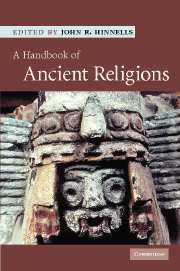Book contents
- Frontmatter
- Contents
- List of illustrations
- List of maps
- List of tables
- List of contributors
- Introduction
- 1 Palaeolithic art and religion
- 2 Ancient Egypt
- 3 Religion in ancient Ugarit
- 4 Mesopotamia
- 5 Ancient Israel to the fall of the Second Temple
- 6 Greek religion
- 7 Religions in the Roman Empire
- 8 Ancient Europe
- 9 The Indus Civilization
- 10 The religion of ancient China
- 11 Aztec and Inca civilizations
- Index
Introduction
- Frontmatter
- Contents
- List of illustrations
- List of maps
- List of tables
- List of contributors
- Introduction
- 1 Palaeolithic art and religion
- 2 Ancient Egypt
- 3 Religion in ancient Ugarit
- 4 Mesopotamia
- 5 Ancient Israel to the fall of the Second Temple
- 6 Greek religion
- 7 Religions in the Roman Empire
- 8 Ancient Europe
- 9 The Indus Civilization
- 10 The religion of ancient China
- 11 Aztec and Inca civilizations
- Index
Summary
The ancient worlds fascinate most people. Few are unmoved at the wonder and awe on seeing the Egyptian mummies, the magnificence of the civilizations of the Aztecs and Incas, and the mystery of ancient China. But the ancient world is not important simply because it is interesting; it also helps us to understand later society. Just as conquerors commonly erected their religious buildings on the holy sites of their victims (churches on temples for example), so also ancient beliefs and practices were often absorbed into later culture. In my own native county of Derbyshire, in pre-Christian times wells where water sprang apparently inexplicably from the ground were decorated with pictures made from flowers at the start of spring. Nowadays this ancient custom has been taken over by the church (and later by the tourist trade!). The pre-Christian symbols are replaced by Christian images and the village priest tours the fields blessing the wells and the lands in order to ensure fertility in the growing season. Most religions take over practices and beliefs from ancient local traditions and reformulate them and by appropriating local traditions indigenize the global religion. Ancient religious figures become local saints. That is one reason why one religion takes on a variety of forms around the world. Christianity, Islam and other traditions have been localized in this way. If one is to understand many features of modern religions, one commonly has to study the past.
- Type
- Chapter
- Information
- A Handbook of Ancient Religions , pp. 1 - 6Publisher: Cambridge University PressPrint publication year: 2007



